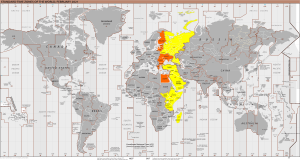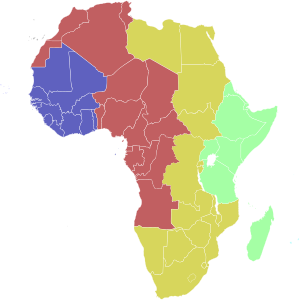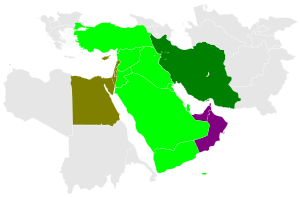UTC+03:00
| UTC+03:00 | |
|---|---|
| Time zone | |
 World map with the time zone highlighted | |
| UTC offset | |
| UTC | UTC+03:00 |
| Current time | |
| 20:42, 30 December 2024 UTC+03:00 [refresh] | |
| Central meridian | |
| 45 degrees E | |
| Date-time group | |
| C | |


| Light Blue | Cape Verde Time[a] (UTC−1) |
| Blue | Greenwich Mean Time (UTC) |
| Red | (UTC+1) |
| Ochre | (UTC+2) |
| Green | East Africa Time (UTC+3) |
| Turquoise | (UTC+4) |
b Mauritius and the Seychelles are to the east and north-east of Madagascar respectively.

▉▉▉ Standard time observed all year
▉ Daylight saving time observed

| Light Blue | Western European Time / Greenwich Mean Time (UTC) |
| Blue | Western European Time / Greenwich Mean Time (UTC) |
| Western European Summer Time / British Summer Time / Irish Standard Time (UTC+1) | |
| Red | Central European Time (UTC+1) |
| Central European Summer Time (UTC+2) | |
| Yellow | Eastern European Time / Kaliningrad Time (UTC+2) |
| Ochre | Eastern European Time (UTC+2) |
| Eastern European Summer Time (UTC+3) | |
| Green | Moscow Time / Turkey Time (UTC+3) |
| Turquoise | Armenia Time / Azerbaijan Time / Georgia Time / Samara Time (UTC+4) |
▉▉▉ Dark colours: Summer time observed

| KALT | Kaliningrad Time | UTC+2 | (MSK−1) | |
| MSK | Moscow Time | UTC+3 | (MSK±0) | |
| SAMT | Samara Time | UTC+4 | (MSK+1) | |
| YEKT | Yekaterinburg Time | UTC+5 | (MSK+2) | |
| OMST | Omsk Time | UTC+6 | (MSK+3) | |
| KRAT | Krasnoyarsk Time | UTC+7 | (MSK+4) | |
| IRKT | Irkutsk Time | UTC+8 | (MSK+5) | |
| YAKT | Yakutsk Time | UTC+9 | (MSK+6) | |
| VLAT | Vladivostok Time | UTC+10 | (MSK+7) | |
| MAGT | Magadan Time | UTC+11 | (MSK+8) | |
| PETT | Kamchatka Time | UTC+12 | (MSK+9) |
UTC+03:00 is an identifier for a time offset from UTC of +03:00. In areas using this time offset, the time is three hours ahead of the Coordinated Universal Time (UTC). Following the ISO 8601 standard, a time with this offset would be written as, for example, 2019-02-08T23:36:06+03:00.
As standard time (year-round)
Principal cities: Istanbul, Moscow, Saint Petersburg, Doha, Riyadh, Baghdad, Nairobi, Dire Dawa, Addis Ababa, Manama, Sanaa, Aden, Minsk, Kuwait City, Asmara, Antananarivo, Kampala, Amman, Damascus
Africa
East Africa
- Comoros
- Djibouti
- Eritrea
- Ethiopia
- France
- Kenya
- Madagascar
- Somalia
- Somaliland
- South Africa[4]
- Tanzania
- Uganda
Antarctica
- Some bases in Antarctica. See also Time in Antarctica.
- Japan
Asia
Arabia Standard Time
Arabia Standard Time, or AST (indicated by KSA on some Arabic TV stations), is used by some of the countries in the Middle East. As this time zone is predominantly in the equatorial region, there is no significant change in day length throughout the year, so daylight saving time is not observed. Between 1982 and 2007, Iraq observed Arabia Daylight Time (UTC+04:00) but the government abolished DST in March 2008.[5][6]
Arabia Standard Time is used by the following countries:
- Bahrain
- Iraq
- Jordan
- Kuwait
- Qatar
- Saudi Arabia
- Syria
- Yemen
Europe
Most of European Russia, including Moscow, Saint Petersburg, Rostov-on-Don, Novaya Zemlya, Franz Josef Land. From October 26, 2014 Moscow and most other parts of European Russia started using UTC+03:00 again, year-round.[7] Also on September 7, 2016, Turkey started using UTC+03:00 year-round.[8][9] Besides the names mentioned above, the name "Eastern Europe Forward Time"' (EEFT) is sometimes used.
- Belarus
- Russia – Moscow Time[10]
- Turkey – Time in Turkey
- Ukraine
- Russian-occupied territories of Ukraine - Crimea (Crimea Peninsula) or Republic of Crimea, part of Donetsk, Luhansk, Kherson and Zaporizhzhia regions[11][12][13]
Caucasus region
- Georgia (while Georgia remains within UTC+04:00, its two breakaway regions have opted to use UTC+03:00) this includes:
As daylight saving time (Northern Hemisphere summer only)
Principal cities: Kyiv, Bucharest, Athens, Jerusalem, Sofia
Europe
- Bulgaria
- Cyprus
- Estonia
- Finland
- Greece
- Latvia
- Lithuania
- Moldova
- Romania
- Ukraine
- United Kingdom
Asia
- Israel
- Lebanon
Africa
- Egypt[15]
Discrepancies between official UTC+03:00 and geographical UTC+03:00
Areas in UTC+03:00 longitudes using other time zones
Using UTC+04:00:
- Caucasus region:
- Georgia, excluding Abkhazia and South Ossetia
- Armenia
- Azerbaijan
- Russia, with parts of its territories:
- Astrakhan, Samara, Saratov and Ulyanovsk (with an exception of the very east)
- Western half of Udmurtia
- United Arab Emirates
- The westernmost region of the Emirate of Abu Dhabi
- Seychelles
- French Southern and Antarctic Lands
Using UTC+03:30:
- Iran
- The western part, including Tehran
Using UTC+02:00:
- Ukraine (standard time)
- The easternmost part, including Luhansk (the territories under Ukrainian control)
- Sudan
- The very easternmost part in the country
- Mozambique
Areas outside UTC+03:00 longitudes using UTC+03:00 time
Areas between 67°30′ E and 82°30′ E ("physical" UTC+05:00)
- Russia
- The very east of Severny Island with 69°2' E as the easternmost point
Areas between 52°30' E and 67°30' E ("physical" UTC+04:00)
- Yemen
- Socotra, the largest island in the Socotra Archipelago
- The very easternmost part of Al-Mahrah
- Saudi Arabia
- The easternmost part of Sharqiyah
- Russia
- Most of Franz Josef Land, Yuzhny Island, and most of Severny Island (with an exception of the very east)
- Some parts of the Russian mainland (Komi Republic, Nenets Autonomous Okrug, east of Kirov Oblast and Tatarstan)
Areas between 22°30' E and 37°30' E ("physical" UTC+02:00)
- Tanzania
- Uganda
- Kenya
- The western part, including nation's capital Nairobi
- Ethiopia
- Saudi Arabia
- The northwesternmost part, including Tabuk
- Turkey
- Ukraine
- Belarus
- Russia
- The western part, including Saint Petersburg and half of Moscow
Notes
- The westernmost point at UTC+03:00 is the westernmost point of contiguous Russia, near Lavry, Pskov Oblast (27°19' E). The time zone employed there (corresponding to 45°E) is 17°41' E of physical time, i.e. roughly 1 hour and 11 minutes ahead of physical time, making for the largest overall discrepancy between time used and physical time for UTC+03:00.
- The easternmost point at UTC+03:00 is Cape Zhelaniya, Severny Island, Novaya Zemlya, Russia (69°06' E). The time zone employed there (corresponding to 45°E) is 24°06' W of physical time, i.e. roughly 1 hour and 36 minutes behind physical time, making for the largest discrepancy between time used and physical time for UTC+03:00.
- On February 8, 2011, Russian president Dmitry Medvedev issued a decree cancelling daylight saving time in Russia. Under the decree, all clocks in Russia advanced by 1 hour on March 27, 2011, but did not change back the following October, effectively making Kaliningrad Time UTC+03:00 permanently, and Moscow Time UTC+04:00 permanently. This proved unpopular because of the dark mornings, children walking to school and people going to work in complete darkness. On October 26, 2014, Russia permanently returned to standard time by setting the clocks back by 1 hour effectively making Kaliningrad Time UTC+02:00 permanently and Moscow Time UTC+03:00 permanently.
- Ukraine had UTC+02:00 plus regularly EEST from 1990 till 2011 (in years 1981–1990 Moscow Summer Time) until the Ukrainian parliament added 1 hour "on the territory of Ukraine from March 27, 2011" and canceled daylight saving time on September 20, 2011, de facto making EEST (UTC+03:00) the new standard time.[16] After strong criticism from the mass media, on 18 October 2011 the Ukrainian parliament cancelled its previous decision.[17]
See also
References
- ^ "Current Times In Bassas da India..." Time Genie. Retrieved 18 August 2012.
- ^ "Current Time In Europa Island, Europa Island..." Time Genie. Retrieved 18 August 2012.
- ^ "Current Times In Juan de Nova Island..." Time Genie. Retrieved 18 August 2012.
- ^ "World Time Zone Map Section # 19". WorldTimeZone.com. Retrieved 15 July 2012.
- ^ "AST – Arabia Standard Time". timeanddate.com. Retrieved 31 August 2011.
- ^ "Winter time change will be abandoned this year". cnnturk.com. Retrieved 8 September 2016.
- ^ "Russia returns to Standard Time all year". www.timeanddate.com. Retrieved 2024-12-11.
- ^ "Turkey Stays on Daylight Saving Time for Good". Time and Date. September 7, 2016. Retrieved September 7, 2016.
- ^ "Occupied Northern Cyprus to Follow Turkey Time". September 14, 2016. Retrieved September 14, 2016.
- ^ "Russia Time Zone Map". WorldTimeZone.com. Retrieved 22 March 2018.
- ^ "Ukraine: Luhansk and Donetsk move to Moscow Time". www.timeanddate.com. Retrieved 5 September 2018.
- ^ "DPR and LPR switch over to Moscow time". Retrieved 5 September 2018.
- ^ "DST News - Donetsk and Lugansk Republics UTC+2 will join Moscow time zone UTC+3 at 3am on October 26 2014". www.worldtimezone.com. Retrieved 5 September 2018.
- ^ a b "Transition to winter time will take place in Abkhazia in parallel with Russia - Vestnik Kavkaza". vestnikkavkaza.net. 22 June 2012. Retrieved 5 September 2018.
- ^ "Egypt to reapply daylight-saving time annually to rationalise use of energy". Ahram. 1 March 2023. Retrieved 20 March 2023.
- ^ "Ukraine cancels use of daylight saving time". Kyiv Post. 20 September 2011.
- ^ "Ukraine to return to standard time on Oct. 30 (updated)". Kyiv Post. 18 October 2011. Retrieved 18 October 2011.
